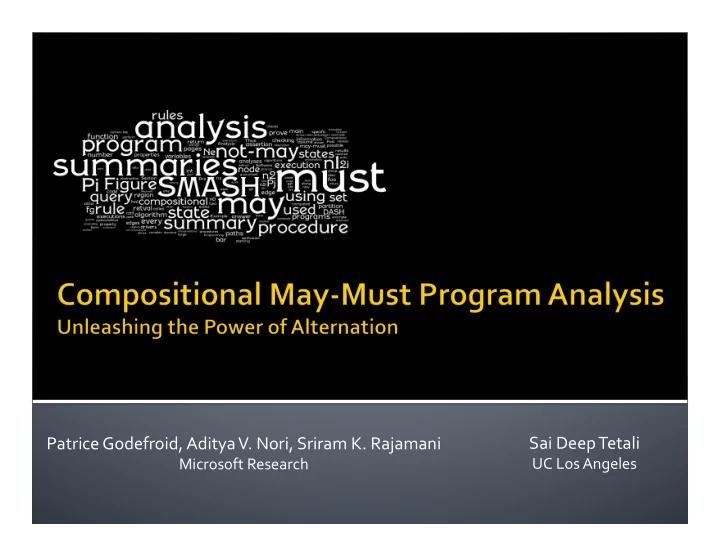

Sai Deep Tetali Patrice Godefroid, Aditya V. Nori, Sriram K. Rajamani Microsoft Research UC Los Angeles
Question Does the assertion hold for all possible inputs? Must analysis: finds bugs, but can’t prove their absence May analysis: can prove the absence of bugs, but can result in false errors
May analysis = predicate abstraction ( SLAM ) Must analysis = symbolic execution + tests ( DART ) Compositional May‐Must analysis : Interprocedural analysis Memoize and re‐use may/must summaries Allows fine‐grained coupling and alternation SMASH ≫ Compositional-May || Compositional-Must !
test void f() { 0: *p = 4; 1: *q = 5; }
proof 0 void f() { 0: *p = 4; 1 1 1: *q = 5; } 2
7
0 1 2 2 4 3 5 6 7
0 1 2 2 4 3 5 6 7
0 1 frontier 2 4 3 5 6 7
0 1 frontier 2 4 3 5 6 7
0 1 frontier 2 2 4 3 5 6 7
must summary
must summary • Generate post states by using must summaries
must summary
0 1 2 4 3 5 6 7
0 1 2 2 4 3 5 6 7
0 must summary 1 frontier 2 4 3 5 6 7
0 must summary 1 frontier 2 4 3 5 6 7
0 1 frontier 2 2 4 3 5 6 7
must must must must must must must must must
The SMASH implementation is a deterministic realization of the declarative rules Input C program is first abstractly interpreted No pointer arithmetic ‐‐ *(p+i) is treated as *p Logic encoding ‐‐ propositional logic, linear arithmetic and uninterpreted functions Theorem prover: Z3
Statistics Das SMAS h H 0 39 0 12 Number of proofs 2176 2228 Number of bugs 64 64 Time‐outs 61 9 Time (hours) 117 44 We have unleashed the power of alternation! 69 drivers ( 342000 LOC) and 85 properties
SMASH is a unified framework for compositional may‐must program analysis We have explained SMASH in the context of existing analyses ( SLAM , DART , Synergy / Dash …) in the area Empirical evaluation shows that SMASH can significantly outperform may‐only, must‐only and non‐compositional may‐must algorithms
http://research.microsoft.com/yogi
Recommend
More recommend